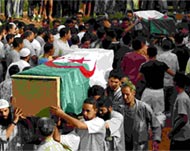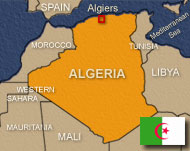Victims groups question Algeria amnesty
A campaign for a referendum on a civil war amnesty has started in Algeria, but advocates for victims worry that the law will allow the perpetrators of atrocities to escape justice.

The amnesty, announced recently by President Abdelaziz Bouteflika, has been proposed as a way to close a chapter on the nation’s 10-year civil war, which claimed about 150,000 lives.
“They think they can tear the pages of 10 years of violence from our memory, give us money and make us forget about our disappeared,” said Safia Fahassi, 39, a spokeswoman for the Algerian Coordination of the Families of the Disappeared.
Fahassi said her husband, a journalist, was kidnapped in May 1995 and was never found.
The amnesty would drop criminal charges against members of armed Islamist groups who did not participate in massacres, bombings in public areas or rapes as well as give immunity to members of the security services who were linked to disappearances and violence.
Members of armed groups who committed crimes against individuals or targeted soldiers would have immunity, but they also would be barred from political activity.
Cycle of violence
“This is the only way to break the cycle of violence and achieve our aim of durable peace, turn a horribly bloodied page and close a period made of death, destruction and grief,” said Bouteflika on 14 August.
For the first time since the civil war started in 1992, the disappeared who were abducted by members of security services are being considered “victims of the national tragedy” and their relatives will be offered compensation.
 |
|
About 150,000 people were killed |
The civil war was triggered when the army cancelled the nation’s first multiparty elections, which an Islamist party was poised to win.
The referendum will be conducted on 29 September, but there is apprehension among victims’ families that the amnesty will end their quest for justice.
Several victims’ associations announced on 20 August that they oppose the amnesty and urged Algerians to vote against it.
Brothers killed
“National reconciliation cannot be achieved on the grounds of impunity. Responsibilities on both sides of the civil war have to be clearly determined first,” said Ali Merabet, who leads the Somoud Association of the Families of Victims Abducted by Islamist Armed Groups.
Merabet, a 41-year-old school sports coach, never dealt with politics until July 1995, when his two brothers, Aziz, 28, and Merzak, 14, were kidnapped by members of the GIA, killed and buried in the backyard of a farm in the outskirts of Algiers.
“We are not against a national reconciliation, but we do say ‘no’ to an amnesty decided in a hurry without going through a process that will recover truth and justice,” Merabet says.
Forgiveness can only be given by the families of the victims, Merabet says, and only if the perpetrators of the crimes publicly confess and ask the families for forgiveness.
“We do not want to be perceived by the rest of the population as peace-haters – we want a national reconciliation, but a true one,” he insists.
Change of heart
Others have come to accept the idea of amnesty.
Fatima-Zahra Flici, a deputy of the National Democratic Rally, the second-largest party of the governmental coalition, is the widow of a famous Algerian intellectual killed by the Islamist Armed Groups (GIA) in 1993.
 |
A few years ago, says Flici, who became the leader of the Algerian National Organisation of Victims of Terrorism, she never would have accepted the idea of “forgiving the terrorists”, but today she acknowledges she has changed.
“Since terrorism started and until 1999, we were against any idea of forgiving, but today with time passing, we think about the future of our children. We do not want them to grow up with the sentiment of vengeance; we do not want them to be fed with hatred.”
Bouteflika’s proposal is a positive step if it is meant to be the starting point for a national debate about national reconciliation, said Ali Yahia Abdennour, president of the Algerian League for Defence of Human Rights.
“National reconciliation is a political issue. It cannot only be achieved through security and social measures. There should be a political solution, truth should be said about overwhelming human rights violations committed by the Islamist armed groups, the army, the security services,” Abdennour said.
Early reconciliation effort
In 1999, during Bouteflika’s first presidential term, the country went through a reconciliation with the Civil Harmony Law, which was intended to guarantee immunity to members of armed groups who did not commit violence and reduce sentences for those who killed, raped or bombed civilians.
|
“We all are dreading that this law will definitively close the doors on our demand for truth” |
This law was controversial among Algerian and foreign human-rights organisations but was enthusiastically endorsed by referendum.
It resulted in the disarming of several thousand members of the armed groups and the return of stability and security.
The new amnesty would benefit members of the security services, who were accused by many international human rights organisations of failing to protect civilians during the massacres of the 1990s or of indirect involvement in those massacres.
“There is no doubt that amnestying members of security forces is what makes the difference between the previous civil harmony law, which was meant only for armed groups, and this coming amnesty,” said Farouk Ksentini, head of the Algerian Commission for Promoting Human Rights.
For the associations of the families of victims, providing amnesty to those involved in “the fight against terrorism” means giving immunity to criminals who caused the disappearance of 6146 people, Ksentini’s commission says.
For Fahassi, who says her husband was kidnapped by police officers because he was suspected of having links with armed Islamist groups, what is more troubling than giving amnesty to the abductors is the idea of “being forever forbidden from knowing the truth”.
The families of the disappeared, she says, “still hope to know what happened to their loved ones. They still don’t know if they are dead or alive, and we all are dreading that this law will definitively close the doors on our demand for truth”.